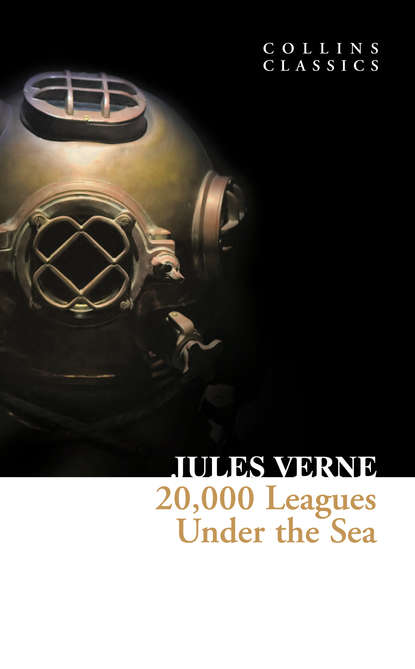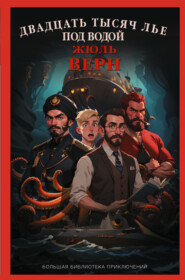По всем вопросам обращайтесь на: info@litportal.ru
(©) 2003-2025.
✖
20,000 Leagues Under The Sea
Настройки чтения
Размер шрифта
Высота строк
Поля
I understood, though, that Ned Land should get more exasperated with the thoughts that took possession of his brain. I heard him swearing in a gruff undertone, and saw his looks again become threatening. He rose, moved about like a wild beast in a cage, and struck the wall with his fist and foot. Moreover, time was going, hunger was cruelly felt, and this time the steward did not appear. If they had really good intentions towards us they had too long forgotten our shipwrecked condition.
Ned Land, tormented by the twinges of his robust stomach, became more and more enraged, and notwithstanding his promise I really feared an explosion when he would again be in the presence of the men on board.
Two more hours rolled on, and Ned’s anger increased; he cried and called at the top of his voice, but in vain. The iron walls were deaf. The boat seemed quite still. The silence became quite oppressive.
I dare no longer think how long our abandonment and isolation in this cell might last. The hopes that I had conceived after our interview with the commander of the vessel vanished one by one. The gentle look of this man, the generous expression of his face, the nobility of his carriage, all disappeared from my memory. I again saw this enigmatical personage such as he must necessarily be, pitiless and cruel. I felt him to be outside the pale of humanity, inaccessible to all sentiment of pity, the implacable enemy of his fellow men, to whom he had vowed imperishable hatred.
But was this man going, then, to let us perish from inanition, shut up in this narrow prison, given up to the horrible temptations to which ferocious famine leads? This frightful thought took a terrible intensity in my mind, and imagination helping, I felt myself invaded by unreasoning fear. Conseil remained calm. Ned was roaring. At that moment a noise was heard outside. Steps clanged on the metal slabs. The bolts were withdrawn, the door opened, the steward appeared.
Before I could make a movement to prevent him, the Canadian had rushed upon the unfortunate fellow, knocked him down, and fastened on his throat. The steward was choking under his powerful hand.
Conseil was trying to rescue his half-suffocated victim from the hands of the harpooner, and I was going to join my efforts to his, when, suddenly, I was riveted to my place by these words, spoken in French: –
‘Calm yourself, Mr Land, and you, professor, please to listen to me.’
CHAPTER 10 Nemo (#ulink_d873d02b-7f0c-5347-9a11-5f3e1d822040)
The man who spoke thus was the commander of the vessel.
When Ned Land heard these words he rose suddenly.
The almost strangled steward went tottering out on a sign from his master; but such was the power of the commander on his vessel that not a gesture betrayed the resentment the man must have felt towards the Canadian. Conseil, interested in spite of himself, and I stupefied, awaited the result of this scene in silence.
The commander, leaning against the angle of the table, with his arms folded, looked at us with profound attention. After some minutes of a silence which none of us thought of interrupting, he said in a calm and penetrating voice, –
‘Gentlemen, I speak French, English, German, and Latin equally well. I might, therefore, have answered you at our last interview, but I wished to know you first, and afterwards to ponder on what you said. The stories told by each of you agreed in the main, and assured me of your identity. I know now that accident has brought me into the presence of M. Pierre Aronnax, Professor of Natural History in the Paris Museum, charged with a foreign scientific mission, his servant Conseil, and Ned Land, of Canadian origin, harpooner on board the frigate Abraham Lincoln, of the United States navy.’
I bent my head in sign of assent. There was no answer necessary. This man expressed himself with perfect ease, and without the least foreign accent. And yet I felt that he was not one of my countrymen. He continued the conversation in these terms: –
‘I dare say you thought me a long time in coming to pay you this second visit. It was because, after once knowing your identity, I wished to ponder upon what to do with you. I hesitated long. The most unfortunate conjuncture of circumstances has brought you into the presence of a man who has broken all ties that bound him to humanity. You came here to trouble my existence—’
‘Unintentionally,’ said I.
‘Unintentionally,’ he repeated, raising his voice a little. ‘Is it unintentionally that the Abraham Lincoln pursues me in every sea? Was it unintentionally that you took passage on board her? Was it unintentionally that your bullets struck my vessel? Did Mr Land throw his harpoon unintentionally?’
‘You are doubtless unaware,’ I answered, ‘of the commotion you have caused in Europe and America. When the Abraham Lincoln pursued you on the high seas, every one on board believed they were pursuing a marine monster.’
A slight smile curled round the commander’s lips, then he went on in a calmer tone, –
‘Dare you affirm, M. Aronnax, that your frigate would not have pursued a submarine vessel as well as a marine monster?’
This question embarrassed me, for it was certain that Captain Farragut would not have hesitated. He would have thought it as much his duty to destroy such a machine as the gigantic narwhal he took it to be.
‘You see, sir,’ continued the commander, ‘I have the right to treat you as enemies.’
I answered nothing, and for a very good reason; the unknown had force on his side, and it can destroy the best arguments.
‘I have long hesitated,’ continued the commander. ‘Nothing obliges me to give you hospitality. I could place you upon the platform of this vessel, upon which you took refuge; I might sink it beneath the waters and forget that you ever existed. I should only be using my right.’
‘The right of a savage, perhaps,’ I answered, ‘but not that of a civilised man.’
‘Professor,’ quickly answered the commander, ‘I am not what is called a civilised man. I have done with society entirely for reasons that seem to me good, therefore I do not obey its laws, and I desire you never to allude to them before me again.’
This was uttered clearly. A flash of anger and contempt had kindled in the man’s eyes, and I had a glimpse of a terrible past in his life. He had not only put himself out of the pale of human laws, but he had made himself independent of them, free, in the most rigorous sense of the word, entirely out of their reach. Who, then, would dare to pursue him in the depths of the sea, when on its surface he baffled all efforts attempted against him? What armour, however thick, could support the blows of his spur? No man could ask him for an account of his works. God, if he believed in Him, his conscience, if he had one, were the only judges he could depend upon.
These reflections rapidly crossed my mind, whilst the strange personage was silent, absorbed, withdrawn into himself. I looked at him with terror mingled with interest, doubtless as Oedipus considered the Sphinx.
After a rather long silence the commander went on speaking.
‘I have hesitated, therefore,’ said he, ‘but I thought that my interest might be reconciled with that natural pity to which every human being has a right. You may remain on my vessel, since fate has brought you to it. You will be free, and in exchange for this liberty which, after all, will be relative, I shall only impose one condition upon you. Your word of honour to submit to it will be sufficient.’
‘Speak, sir,’ I answered. ‘I suppose this condition is one that an honest man can accept?’
‘Yes; it is this: It is possible that certain unforeseen events may force me to consign you to your cabin for some hours, or even days. As I do not wish to use violence, I expect from you, in such a case, more than from all others, passive obedience. By acting thus I take all the responsibility; I acquit you entirely, by making it impossible for you to see what ought not to be seen. Do you accept the condition?’
So things took place on board which were, at least, singular and not to be seen by people who were not placed beyond the pale of social laws.
‘We accept,’ I replied. ‘Only I ask your permission to address to you one question – only one. What degree of liberty do you intend giving us?’
‘The liberty to move about freely and observe even all that passes here – except under rare circumstances – in short, the liberty that my companions and I enjoy ourselves.’
It was evident that we did not understand each other.
‘Pardon me, sir,’ I continued, ‘but this liberty is only that of every prisoner to pace his prison. It is not enough for us.’
‘You must make it enough.’
‘Do you mean to say we must for ever renounce the idea of seeing country, friends, and relations again?’
‘Yes, sir. But to renounce the unendurable worldly yoke that men call liberty is not perhaps so painful as you think.’
‘I declare,’ said Ned Land, I’ll never give my word of honour not to try to escape.’
‘I did not ask for your word of honour, Mr Land,’ answered the commander coldly.
‘Sir,’ I replied, carried away in spite of myself, ‘you take advantage of your position towards us. It is cruel!’
‘No, sir, it is kind. You are my prisoners of war. I keep you when I could, by a word, plunge you into the depths of the ocean. You attacked me. You came and surprised a secret that I mean no man inhabiting the world to penetrate – the secret of my whole existence. And you think that I am going to send you back to that world? Never! In retaining you, it is not you I guard, it is myself!’
These words indicated that the commander’s mind was made up, and that argument was useless.
‘Then, sir,’ I answered, ‘you give us the simple choice between life and death?’
‘As you say.’
‘My friends,’ said I, ‘to a question thus put there is nothing to answer. But no word of honour binds us to the master of this vessel.’
‘None, sir,’ answered the unknown.

















